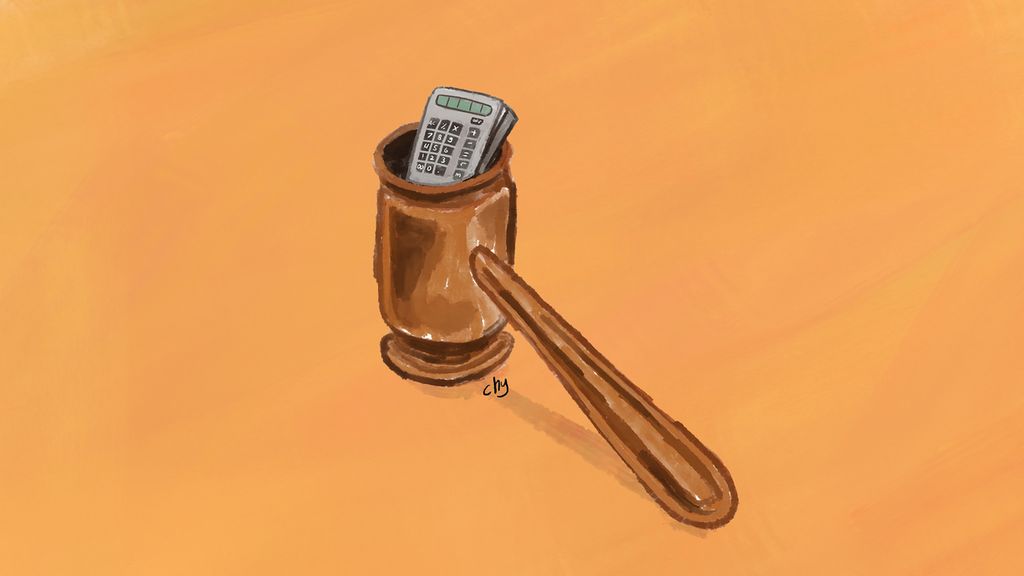Financial Sector Law Enforcement
The financial sector plays a very significant role in driving a country's economic growth. Therefore, rules and law enforcement in financial sector activities must be able to create legal certainty.

During the 2019-2021 period, a total of 19,711 cases of financial services were reported to the Financial Services Authority (OJK) with 10,441 (52.97 percent) minor or moderate violation cases and 9,270 (47.03 percent) serious violations.
Fraud, credit or financing restructuring, allegations of data abuse, objections to installment bills and debt-collector behavior were the most common types of cases reported in the third quarter of 2021.
In 2022, the Investment Alert Task Force took action on 80 illegal online loans, 9 illegal investments and 9 illegal mortgage businesses. In the capital market, OJK handled 29 cases of investor complaints.
The high number of public complaints can be interpreted from several aspects. First, the increase in illegal cases in the financial service sector is a warning that financial literacy is still low. People's understanding about financial services and investment instrument risk needs to be continuously improved.
Also read:
> Green Transformation in Financial Sector
> President: Optimistic, but Still Vigilant
Second, this indicates Indonesia's low position (as showed in ASEAN Corporate Governance Association survey) in the aspects of governance and law enforcement, including in the financial sector. Third, the reported figure calls an urgency to increase the protection of investors and consumers in the financial sector.
The financial sector plays a very significant role in driving a country's economic growth. It serves as a locomotive for real sector growth through capital accumulation and technological innovation to create various business models and financial products and services. Therefore, rules and law enforcement in financial sector activities must be able not only to create legal certainty, but integrally bring impacts on the economic and social development.
In a discussion on the Financial Sector Development and Strengthening (P2SK) bill with the House of Representatives Commission XI, which oversees demographic affairs, health, manpower and transmigration, in December 2022, the Finance Minister said, “The financial sector is a trust-based business. Without trust the financial sector will become stunted."
In the midst of low public trust in law enforcement in Indonesia, a tougher approach of prosecution of the rife crimes in the financial sector is needed to effectively provide a deterrent, build public trust and ensure the running wheel of industrial activity.

Restorative justice
Law enforcement in the financial sector should not simply be interpreted as always having to process criminal acts with punishment. It is necessary to prioritize the mitigation of the condition of the affected parties by upholding what is known as the principle of restorative justice.
The objective is to provide protection for victims and affected parties involved in the financial sector in order that the financial sector activities remain stable and sustainable.
In addition to refining the formulation of offenses and adjusting the nominal criminal sanctions in accordance with the prevailing development in the financial sector, Law No. 4/2023 concerning P2SK, which was enacted on 13 Jan. 2023, also harmonizes law enforcement in industries based on respective characteristics by prioritizing the principle of restorative justice and emphasizing the use of criminal sanctions as the last remedy (ultimum remedium).
Also read:
> Hopes Pinned on Omnibus Law for Financial Sector
The implementation of restorative justice mandated in the P2SK law is reflected in the rules on the non-prosecuting mechanism introduced in the banking and nonbanking financial industry (IKNB) as well as the rules on lex specialis (law governing a specific subject matter) that strengthen the existing regulations through the implementation of una via (only one but correct way) principle in the capital market as part of an adjustment to the character of this industry.
From various literatures, the notion of non-prosecuting mechanism arises from the need for law enforcement against criminal acts in business activities. Law enforcers are required to pay attention to the nature of economic activity, which not only intersects with aspects of criminal law, but also aspects of administrative law and civil rights.
This mechanism allows the law enforcers the authority either to prosecute corporate and business crimes or delay (not prosecute) on condition that the crime perpetrators are willing to comply with the terms and conditions on loss recovery set by law enforcement. Such a hybrid approach in law enforcement of criminal offenses in business activities is not new and has been implemented in several countries, such as the United Kingdom, the United States and Canada.
Also read: OJK Needs Strong Commitment to Respond to Public Challenges
The non-prosecuting mechanism in the P2SK Law gives OJK an authority not to carry on the investigation to examination stage, instead seeking settlements through administrative processes.
The settlement is carried out through disgorgement, which requires the parties who have capitalized on the illegal or wrongful acts to give up any profits they have made in the illegal acts, law violations or crimes.
The non-prosecution mechanism in the capital market is implemented through the una via principle, which allows authorities as representation of the public interest to choose whether to take action against criminal violations through administrative or judicial (court) channels. This choice of sanction implementation aims to stem imposition of multiple sanctions on the violator for the same violation, especially in criminal acts.
The application of the una via principle was basically mandated in Law No. 8/1995 concerning Capital Markets before being revised in the P2SK law with more strengthened legal basis.
In handling capital-market crimes, the OJK is given the authority on whether or not to step up its investigation to examination stage by taking into account certain parameters, including sanctions and administrative measures.

Investor/consumer protections
The application of una via principle comes down to the fact that violations in the capital market are diverse in terms of types, modus operandi and the magnitude of incurred losses. Given this fact, not all violations in the capital market sector must proceed to the examination stage due to concerns that this could hamper the offering and/or trading of securities as a whole.
The P2SK law gives more assured protection for capital market investors and consumers in financial services given its stipulating provision that administrative actions and sanctions can also be pursued through "written instructions" ordering the perpetrators of violations and/or criminal acts to return the profits obtained. Therefore, the affected parties can be compensated for what they have lost and the perpetrators avoid punishment in what is referred to as a disgorgement measure.
In the field of banking and non-banking financial industries, the non-prosecution mechanism is a new concept introduced in the P2SK law which places an emphasis on harmonization of law enforcement in the financial sector by prioritizing victim recovery measures.
Also read: Importance of Technology-Based Regulation and Supervision
Through this provision, at the investigation stage, a party suspected of having committed a crime in financial services is allowed to submit a request to the OJK for administrative settlement over the violations of laws and regulations.
If the OJK approves the request, the party submitting the request for settlement over the breach of law must carry out the non-prosecution agreement (NPA), including paying compensation. The case is subsequently settled without the need to proceed to the examination stage.
In order to fulfill a sense of justice in deciding whether or not a case will need to proceed from investigation to examination stage, the implementation of una via principle and the non-prosecution mechanism considers the following parameters: 1) transaction value and/or losses incurred in a violation case; 2) whether or not there is settlement for losses arising from criminal acts; 3) the impact on the industry and/or the interests of customers, investors and/or the public.
For the capital market, the considerations include 4) the consequences of criminal acts in securities offering and/or trading activities as a whole.
The spirit of implementing una via principle, NPA and disgorgement is a manifestation of a restorative justice system. The goal in general is that the perpetrators of criminal acts are held responsible to compensate for the losses caused by their wrongdoings. From the perspective of the financial services industry, this law enforcement model is expected to effectively resolve problems in a just, quick and efficient manner so that industrial activities can keep running while market integrity can be maintained.
Finally, the law enforcement carried out in any sector basically aims at accommodating people's sense of justice and ensuring legal certainty, while at the same time maintaining the interests of the nation and state as a whole. Efforts to achieve these three legal objectives are expected to create sustainable justice.
April Sya'bani
Financial sector policy analyst at the Finance Ministry's Fiscal Policy AgencyThis article was translated by Musthofid.